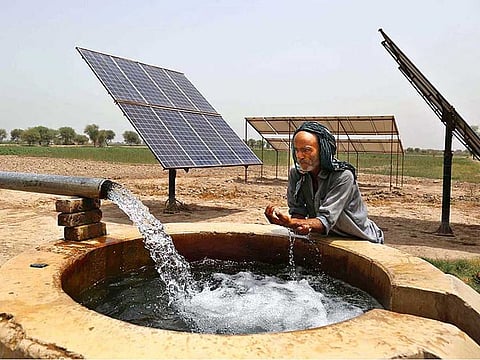Pakistan must safeguard its institutions
Politicians should learn to behave democratically and go beyond offering lip service

The chaos surrounding a well-respected police chief posted to Pakistan’s southern Sindh province has yet again exposed the country’s crisis of governance.
The decision of the provincial government of Sindh to abruptly seek the removal of Kaleem Imam, the Inspector General of Police in the province, has sparked widespread anxiety among the provincial authority, undermining the independence of police officers. In contrast, the federal government of Prime Minister Imran Khan appears to be digging its heels though it may eventually yield to pressure from Sindh.
Imam, counted among Pakistan’s best senior police officers, has had vast experience within the country and internationally, with a range of recognitions to his credit. However, he appears to have fallen out of favour with senior figures in the Pakistan People’s Party (PPP), currently in charge of Sindh’s provincial government, amid reports of his refusal to accept demands from ruling politicians that he deemed to be potentially unlawful.
This continuing drama is a powerful reminder of two inter-related aspects to Pakistan’s model of governance. On one hand, the police have clearly become politicised to the extent where senior and well-reputed figures like Imam find it impossible to operate independently. A more pliant individual may have yielded ground, given the intensity of the pressure every day. PPP politicians have missed no opportunity to come out publicly and repeatedly to share their dismay over Imam as they clamour for his immediate replacement.
Shortage of patience
Yet, in the past 18 months or so since the PPP came to power, Imam is the second inspector general who has been targeted. Clearly, the political authorities in Sindh appear to be impatient with the provincial police chiefs.
On the other hand, there are multiple pertinent questions over the fundamental motivation that drives the PPP’s top brass. They are seeking to replace the police chief with someone who will comply with their whims and wishes.
Fundamentally, this is a very dangerous trend. Left unchecked, this is likely to turn the police to a tool for political parties rather than remaining an independent organ of the state.
The future of Pakistan will depend on the country’s ability to solve real-life issues and work towards making organs of the state more independent and professional.Farhan Bokhari, Pakistan commentator
The controversy surrounding the police chief comes amid signs of deteriorating quality of life for citizens, sparked by economic conditions and demands tied to an IMF loan programme. In the past two years, slumping economic growth coupled with the rising tariff on basic commodities and food items, have together caused inflation to rise steeply.
Eventually, Pakistan lives with the extreme consequences of palpable stagflation, combining a stagnant country and rising inflation. It is a trend that may eventually prompt a widespread public backlash as witnessed in other countries.
For Imran Khan and his partners who rule Pakistan’s provinces, the writing on the wall ought to be abundantly clear. Without any relief in sight, people are crying for help. Pakistan’s farm economy, which provides income directly or indirectly to around half the country’s population, continues to underperform. In recent memory, the main crops have either failed or faltered. But ruling politicians are visibly complacent.
The dream of food security
Since the last national elections in 2018, there has hardly been any memorable debate in the federal or provincial legislatures to address the challenges facing millions of Pakistanis. Food security has now become a dream of yesteryears. In recent weeks, Imran’s government has faced a volley of criticism from across the board, over the failure to anticipate a coming shortage of wheat, with prices shooting up by as much as 40 to 50 per cent in many areas.
It’s time Pakistan’s politicians learn to behave democratically, beyond offering just lip service to this very worthwhile cause. Unless Pakistan’s legislative structures learn to focus on real-life issues, Pakistanis would be well within their rights to reject their elected representatives.
The current trends are likely to spawn more uncertainty as poor economic conditions will force more austerity measures than ever witnessed in the nation’s history. However, the obsession with removing one police chief or another in Sindh has exposed the failure of Pakistan’s politicians in the province.
The future of Pakistan will depend on the country’s ability to solve real-life issues and work towards making organs of the state more independent and professional. A failure to do so will result in chaos everywhere. In such a situation, ruling politicians — federal or provincial — will fail in leading Pakistan towards greater stability and prosperity. The petty battles to decide who controls is symptomatic of a bigger malaise.
— Farhan Bokhari is a Pakistan-based commentator who writes on political and economic matters.


